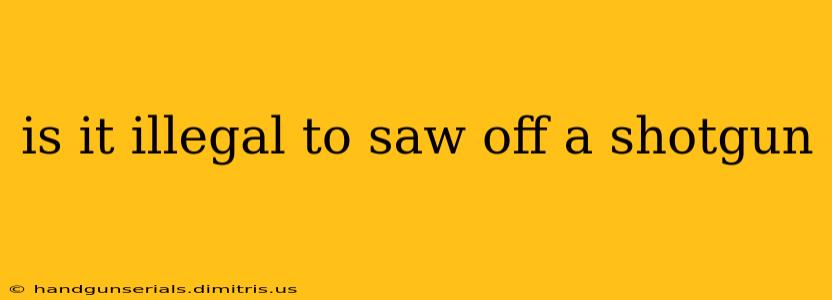Is It Illegal to Saw Off a Shotgun? A Comprehensive Guide to NFA Regulations
The short answer is: yes, sawing off a shotgun is almost certainly illegal in the United States. This act drastically alters the firearm, creating a weapon subject to strict regulations under the National Firearms Act (NFA) of 1934. Understanding the specifics of these regulations is crucial to avoid serious legal consequences.
What Constitutes a "Sawed-Off" Shotgun?
The NFA defines a "short-barreled shotgun" (SBS) as any shotgun having a barrel or barrels less than 18 inches in length. Crucially, this also includes any weapon made from a shotgun that has been modified to have a barrel less than 18 inches long. Simply shortening the barrel, even by a small amount, constitutes a violation. Additionally, an overall length (including the stock) of less than 26 inches also qualifies a shotgun as an SBS under federal law.
The Penalties for Illegal Modification
The penalties for possessing an unregistered SBS are severe and can include:
- Significant fines: These can reach tens of thousands of dollars.
- Imprisonment: Sentences can range from years to decades, depending on the circumstances and the individual's criminal history.
- Loss of firearm rights: Convictions under the NFA can permanently prohibit an individual from owning firearms in the future.
Exceptions and Legal Considerations
While generally illegal, there are some limited exceptions that might apply in very specific circumstances. These are usually related to legitimate law enforcement or military purposes and require rigorous registration and licensing procedures. It is not advisable to attempt to navigate these exceptions without the expert guidance of a firearms lawyer. Even with exceptions, obtaining permits and approvals for modifications is an exceptionally complex and rigorous process.
Why Are Sawed-Off Shotguns Illegal?
The illegality stems from the increased lethality and concealability of short-barreled shotguns. The shorter barrel reduces the effective range, but increases the weapon's maneuverability and ease of concealment, making it particularly dangerous for both the user and potential victims.
The Importance of Understanding Federal and State Laws
It's critical to remember that federal laws regarding firearms, such as the NFA, are in effect nationwide. However, states also have their own laws and regulations concerning firearms modifications, possession, and use. These state laws can be stricter than federal law, leading to even harsher penalties for violations. Always consult both federal and state statutes before undertaking any modifications to a firearm.
Seeking Professional Guidance
Modifying firearms is a serious matter with potentially dire legal ramifications. If you have questions about firearm modifications, always consult with a qualified legal professional specializing in firearms law. Attempting to interpret these complex laws independently could have severe consequences.
Disclaimer: This information is for educational purposes only and does not constitute legal advice. The laws concerning firearms are complex and subject to change. Always seek professional legal counsel for guidance on specific legal matters.

